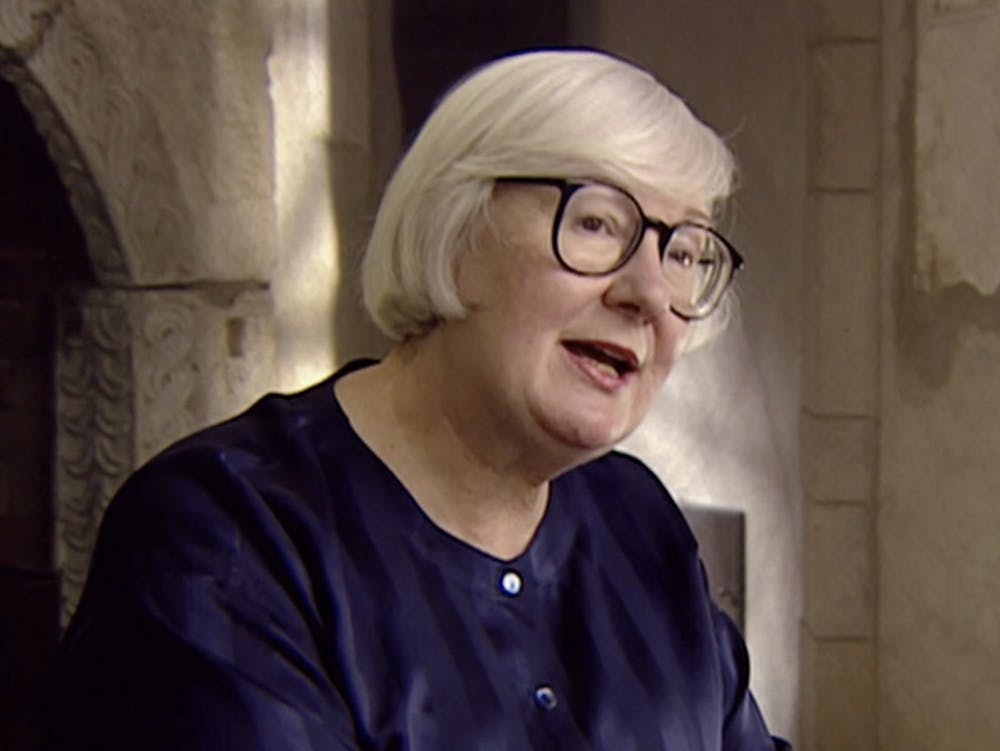Elizabeth Clark, John Carlisle Kilgo professor emerita of religion and professor of history at Duke, passed away on Sept. 7 at the age of 82. She is remembered for her strong advocacy for women, whether it be through inspiring colleagues and students or transforming the field of patristics through the use of cultural, social and feminist theory.
“She really revolutionized the study of early Christian history. She changed the focus to really try to investigate the role of women in early Christianity,” said Randall Styers, Trinity ‘80 and Graduate School ‘97.
Prior to her four decades at Duke, Clark founded the Department of Religion at what is now the University of Mary Washington and was chair of classics, philosophy, and religion from 1979 to 1982.
During these years, Clark taught five courses per semester ranging from Christianity to Judaism and more. Over the course of her career, Clark published 14 books and received honorary degrees from the University of Uppsala in 2003 and Yale University in 2013.
Clark’s “capacious intellect,” Styers said, would become clear whenever the two would travel together in Europe. Styers noted that Clark could read a large variety of languages; she would translate inscriptions and explain imagery at museums and churches they would visit. Styers particularly recalled visiting a Christian church that was originally a pagan temple in Syracuse, Sicily. Clark, with her keen eyes, pivoted around the church, translating a Latin transcription.
“It was so amazing because it was the kind of detail that I’m sure very few visitors … actually noticed,” Styers said.
Another one of Clark’s gifts as a lecturer and mentor, according to her former doctoral student Maria Doerfler, Graduate School ‘13, was her expertise in “facilitating seminars and bringing people into conversation with one another.”
“She had a tremendous gift for friendship, more so than anybody I have ever known, in a truly just inspiring fashion,” Doerfler said. “She would build bridges.”
Clark was awarded the Dean’s Award for Excellence in Mentoring by Duke’s Graduate School in 2010. Her experience in leadership extends to her prior positions as president of the American Academy of Religion, the North American Patristics Society and the American Society of Church History.
Clark founded Duke’s Center for Late Ancient Studies in 2000. In honor of her achievements and contributions to the field, the space was renamed the Elizabeth A. Clark Center for Late Ancient Studies in 2018 by the Board of Trustees.
Doerfler and professor of religious studies Laura Lieber worked together on the resolution for the renaming as a gift for Clark’s 80th birthday. They set up a surprise party at Rue Cler—Clark’s favorite restaurant—and presented the official document to her before reading it out loud.
“To sort of see it all put in one place and have so many of those who have been touched by her come together and wish her happy birthday was really fantastic,” Lieber said.
To Clark’s former undergraduate student Robin Darling Young, associate professor of church history at the Catholic University of America, Clark was both a professor and a “second mother.”
“Liz encountered many women who she really just cared about so much,” Young said. “It was remarkable to see how many people she could care about and want to succeed. She also had maternal disapproval so you know you had to stick to your work.”
Hannah Ward, Trinity ‘14 and a former student of Clark, remembered Clark’s motivation to push those around her to succeed. This high standard particularly showed itself when Clark returned one of the class’s first midterm papers to her students. While Clark usually had a “happy and chipper” mood, Ward remembered how Clark came in that day appearing more serious than usual and handed out heavily marked papers.
While it felt “intimidating” for her in the moment, Ward appreciated how Clark was “not just teaching about a subject but also making sure [students] developed … as learners.”
Lieber also recalled how committed Clark was to advancing women in academia and felt that Clark constantly motivated others to fulfill what she thought they were capable of.
“She was like my superego,” Lieber said. “The best way to live up to her legacy was to keep paying it forward.”
Throughout her career, Clark was always focused on trying to help her students, Styers said.
“She introduced people. She promoted people’s scholarship and work. And she did all kinds of other tasks that help people’s careers move forward in very productive ways,” Styers said. “Her generosity was legendary among her students.”
Clark’s dedication to including and mentoring her students and colleagues could be seen in her iconic living room gatherings. Fuzzy pillows, a colorful marble center table and modern art produced by students or gifted by colleagues decorated the space. At 8 p.m. sharp, graduate students and colleagues would congregate, drink wine and discuss a recently published book. After an hour, they would spend time getting to know one another.
“She really put [a space] into the service of bringing people together and facilitating the conversations that I think she often felt she couldn’t have or she didn’t have the spaces to have when she was a young scholar,” Lieber said.
Clark’s advocacy for others also translated to her history of political activism. Young recalled when she was in college around the height of student movements, through anti Vietnam War protests and second-wave feminism. Clark, as a professor, would encourage students to demonstrate and be involved.
“She tried to encourage all her students to go out and make their way … to act for the good of American society,” Young said.
Around a month before she passed, Clark planned to give money to numerous political organizations, one being Planned Parenthood. During a visit, Clark placed an envelope in Doerfler’s hands to be hand-delivered to Planned Parenthood headquarters; it contained a check worth more money than Doerfler’s current annual income.
“Liz is a standout … hearing anecdotes … about how Liz had either directly or indirectly shaped [people’s] lives is amazing and incredibly moving,” Doerfler said.
In continuation of Clark’s legacy of generosity, donations can be made in her memory to Planned Parenthood or to the Elizabeth A. Clark Center for Late Ancient Studies.
Clark is survived by her sister, Audrey, her niece Leslie and her two nephews Bruce and Robert.
Get The Chronicle straight to your inbox
Signup for our weekly newsletter. Cancel at any time.

Ayra Charania is a Trinity junior and a senior editor of The Chronicle's 118th volume.

